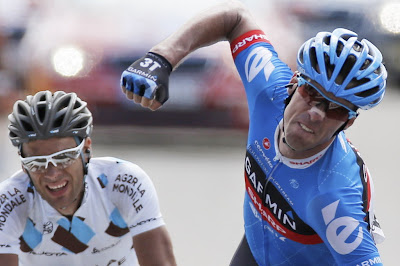Recently there was a romantic piece in the Independent by Rob Penn on the joys of cycling. It concluded with a paragraph that sums up the reason why so many of us spend so much time on the roads cycling or running, on the hillsides walking or scrambling:
If you've ever experienced a moment of awe or freedom on a bicycle; if you've ever taken flight from sadness to the rhythm of two spinning wheels, or felt the resurgence of hope pedalling to the top of a hill with the dew of effort on your forehead; if you've ever wondered, swooping bird-like down a long hill on a bicycle, if the world was standing still; if you have ever, just once, sat on a bicycle with a singing heart and felt like an ordinary man touching the gods, then you share something fundamental with Bradley Wiggins, and you have reason to cheer him down the Champs-Elysées tomorrow.
It is a wonderful expression of how all of our individual efforts are connected.
But wait - scroll further down the comments column and there is antipathy and fear. It is amazing how many people have a visceral hatred of cycling because of boorish people who ignore the rules of the road and assume they can maintain a high speed in cities by relying on everyone else to get put of the way. I hate those people myself and can be as angry as anyone when jumping back to avoid a cyclist who will not stop for the lights. That is not cycling - it is selfish inconsiderate behaviour, which happens in almost any form of human endeavour. But the images are so strong it is all some people think of when they think of cyclists.
The loathing must be countered because there is a growing momentum behind the idea that if more people use the bike for transport the health of the nation will be hugely improved. But for that to happen the infrastructure needs to be improved and that means money and, for the first time in living memory, not putting the car first. In other words a radical step that requires at least the tacit support of a majority of people, so people who don't cycle themselves need to be persuaded that such measures are for the general good. Not easy, especially when you look at the reaction to some of the Olympic traffic lanes and proper, separated cycle lane would have the same effect. It can be done though as Holland and Denmark have proved but our culture is slightly different and we have a vociferous 'Top Gear' faction that makes such change difficult.
Changing hearts and minds is always long and difficult but if it happens and more people cycle the idiots, the lycra louts, seem less representative and the roads will also be safer. More people will feel the sense of exhilaration described by Rob Penn and fewer people will die prematurely through the diseases of sedentary living.
It is an argument worth making.


